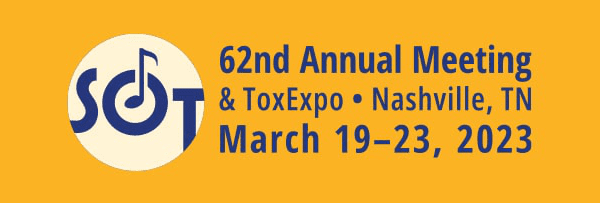We are excited to be back at the annual meeting of SOT this year, which is being held in Nashville between March 19-23, 2023. This year, we will be showcasing our work in the following presentations:
Title: Automating Analysis of Calcium Flux Assay Readouts of Cardiomyocyte cells to identify Mode of Action in Cardiotoxic Compounds
Poster Session Title: Computational Toxicology II
Abstract Number/Poster Board Number: 3673/P158
Presentation Date and Time: March 21 (Tuesday) 9:00 AM – 10:45 AM
Title: Deriving Benchmark Dose from the Deep-Learning Prediction Scores of High-Throughput Toxicology Images (Oral Presentation)
Platform Session Title: Enhancing Toxicology with Machine Learning
Abstract Number: 2033
Presentation Date and Time: March 21 (Tuesday) 1:00 PM – 2:15 PM
Title: Comparative Analysis of Tox21 In Vitro Assay Readouts from Three Major Data-Cleaning Pipelines
Poster Session Title: Alternatives to Mammalian Models III
Abstract Number/Poster Board Number: 3664/P148
Presentation Date and Time: March 21 (Tuesday) 2:30 PM – 4:15 PM
Title: Gene Expression Quality Assessment: Detection of Tissue Contamination or Mislabeling
Poster Session Title: Bioinformatics
Abstract Number/Poster Board Number: 3749/P235
Presentation Date and Time: March 21 (Tuesday) 2:30 PM – 4:15 PM
Title: OrbiTox: Interactive Visualization of Multidomain Experimental and Predicted Data for Translational Discovery (Workshop Symposium)
Workshop Session Title: Computational Visualization Tools for Communicating Large, Complex Data
Abstract Number: 1160
Presentation Date and Time: March 21 (Tuesday) 3:00 PM – 4:30 PM
Title: After Correcting for “Concept Drift,” Deep-Learning Methods Can Now Achieve Human-Level Performance when Predicting Article Exclusion Reasons during ECOTOXicology Knowledgebase Curation
Poster Session Title: Ecotoxicology
Abstract Number/Poster Board Number: 4406/P274
Presentation Date and Time: March 22 (Wednesday) 2:30 PM – 4:15 PM
Title: Comparative Analysis of Ames Test Outcomes across Five OECD-Recommended Strain Groups and Their Various Subsets
Poster Session Title: Late-Breaking 2
Abstract Number/Poster Board Number: 5027/P128
Presentation Date and Time: March 23 (Thursday) 8:30 AM – 11:30 AM
We will also be featured in the following work by our collaborators:
- Use of Survey Sampling to Develop an Evidence Map of Carcinogenic Mechanistic Information for Polycyclic Aromatic Hydrocarbons (PAHs) and Key Characteristics of Carcinogens (KCCs). B.E. Howard, W. Arroyave, L. Schmidt, B. Elmore, W. Bisson, S. Atwood, M. Sethi, A. Ewens, R. Lunn, R. Shah, A. Merrick, A. Wang (Abstract/Poster Number: 3592/P720)
- Adaptive versus Toxicological Responses: Reversibility for DILI with 3D Hepatocyte Transcriptomics. S.S. Ferguson, K. Lavrich, S. Ramaiahgari, S. Auerbach, D. Phadke, M. Balik-Meisner, R. Shah, G. Roberts, J. Gorospe, B. Sparrow, M. DeVito, R.S. Paules, A. Merrick (Abstract/Poster Number: 3010/P111)
- Early Cancer-Associated Genomic Alterations Induced by the Rat Hepatocarcinogens AFB1, DBAQ, and MEG. J.F. Foley, B. Elgart, D. Phadke, D. Mav, I. Tripodi, K. Gerrish, R. Shah, B. Merrick (Abstract/Poster Number: 3590/P718)
- Comparison of Transcriptional Benchmark Dose Modeling and Point-of-Departure Derivation Approaches. J.P. Rooney, L.B. Doonan, R. Shah, R.A. Currie (Abstract/Poster Number: 4115/P613)
- Use of Transcriptomics in Early Stage Agrochemical Research to Identify the Model Candidates. A.K. Goetz, D. Mav, M. Balik-Meisner, D. Phadke, L.B. Doonan, A. Brookhart, R. Shah, R.A. Currie, K.A. Bailey (Abstract/Poster Number: 4113/P611)
- Transcriptomic Profiles of Murine Placental Gene Expression following Developmental Exposure to PFOA or GenX in CD-1 Mice. V.A. Chappell, B.E. Blake, C.N. Miller, H. Nguyen, T.P. Phan, D.P. Phadke, M.R. Balik-Meisner, S.E. Fenton (Abstract/Poster Number: 3786/P273)
- Transcriptional Pathways Linked to Fetal and Maternal Hepatic Dysfunction Caused by Gestational Exposure to Perfluorooctanoic Acid (PFOA) or Hexafluoropropylene Oxide-Dimer Acid (HFPO-DA or GenX) in CD-1 Mice. B. Blake, C. Miller, H. Nguyen, V. Chappell, T. Phan, D. Phadke, M. Balik-Meisner, D. Mav, R. Shah, S. Fenton (Abstract/Poster Number: 3791/P278)
- Integrated Chemical Environment: An Advanced Platform Aiding NAM-Based Chemical Assessments. A. Unnikrishnan, A.L. Karmaus, V. Hull, X. Chang, A. Borrel, K.T. To, A.B. Daniel, S. Cooper, J. Phillips, E. McAfee, D.G. Allen, W. Casey, N.C. Kleinstreuer (Abstract/Poster Number: 3744/P230)
- Biological Response Similarity Analyses and Hierarchical Clustering of Aqueous Film-Forming Foams (AFFF) and Perfluoroalkyl and Polyfluoroalkyl Substances (PFAS) Using In Vitro Hepatocyte Transcriptomics. K.A. Mauge-Lewis, S. Ramaiahgari, G. Roberts, S. Waidyanatha, S. Fenton, D. Phadke, M. Balik-Meisner, S. Ferguson, J. Gorospe, B. Sparrow (Abstract/Poster Number: 4369/P236)
Hope to see you there!

